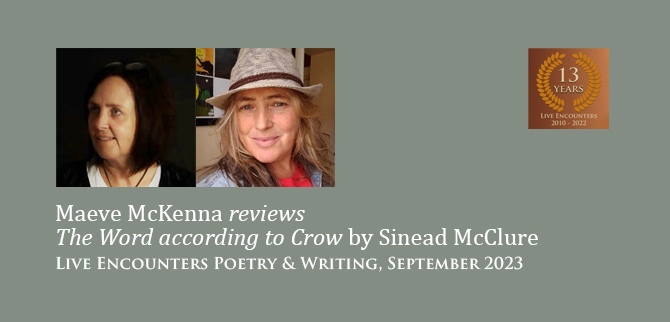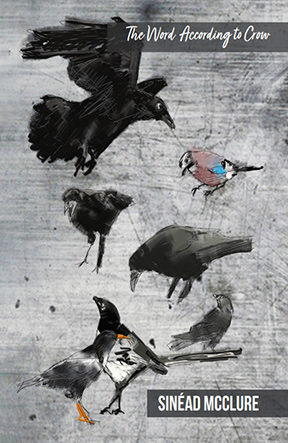
Download PDF Here
Live Encounters Poetry & Writing September 2023
The Word according to Crow by Sinead McClure, book review by Maeve McKenna.
Published by The Calendar Road Press (October 12, 2022).
 Spanning twenty-five poems, The Word According to Crow, guides the reader on a journey into the wilds of North West Ireland where we find its creatures and habitats and witness the challenges faced by those who call this terrain home. In several poems we are also invited into the personal world of the poet; her family, pets and gardens, and her beliefs, also.
Spanning twenty-five poems, The Word According to Crow, guides the reader on a journey into the wilds of North West Ireland where we find its creatures and habitats and witness the challenges faced by those who call this terrain home. In several poems we are also invited into the personal world of the poet; her family, pets and gardens, and her beliefs, also.
Nature is universal, however, and in these poems we are pulled from our neighbourhoods to many continents, a sense that the world is a small place full of shared experiences, the poet knocking on our door, calling us out from our comfort zones.
Judge Lani O’Hanlon, placing this collection first in the Roscommon Chapbook Award, 2022, wrote; “Sinead McClure is speaking for the earth and her creatures in a different and profound way”.
McClure is a poet who writes of nature with authority, and importantly, integrity. We are bestowed with a myriad of wildlife and their habits, yet in every poem, as humans we become not only reader but witness, and possibly, culprit. These blurred lines create moral dilemmas that unnerve the reader, as do all contradictions we battle in our lives. In every poem there is a cause and effect.
The opening epigraph, taken from the poem, The Padre and the Plantation:
‘There is a void in the forest
where the trees failed to prosper.
A small clearing.
This is where I genuflect’
gives a clear indication of the poet’s deep reverence for nature.
The title poem, The Word According to Crow, includes the refrain ‘I am here’, which achieves a mesmerising chant-like quality that is carried throughout the book.
In Faltering, a beautiful poem about seasons, ‘until it finds winter and drops it upon me, unannounced’, the poet makes a direct address to the wasp in the opening line, ‘I ask the wasp to hold one end of this poem’. This confirms McClure’s deep connections with and understanding of the wildlife around her and is a clear indication of its influence on her writing.
The poem is an introduction to the route McClure will take, not so much leading, more the poet being led by an array of creatures and their experiences who become almost human-like. McClure is not just writing about these animals; they are recounting their lives and struggles through these poems, given a voice by the poet who observes acutely. We follow willingly.
Many poems hint as religion, however there is a distinct irreverence to all things of the church: ‘I want to walk on unconsecrated ground/these are the richest places, unsullied by religion’ from the searing There is no peace, says your God, “for the wicked”.
Perhaps nature is its own belief.
A walk in the country tells of a cow grieving for her dead calf. The narrator, out walking, comes upon the scene. The question ‘is she ok’, is to whom? The answer ‘no’/she will not leave her’. Who offers this reply? McClure uses this technique throughout the book, leaving the reader unsure if the voice is that of the narrator or the animal.
The poem tells a regular tale of the realities of rural life, yet the sense of grief and loss is profound and universal and is conveyed with subtly and a lack of sentimentality. The moment observed captures all loss, the inevitability of how cruel life can sometimes be. Is the poet asking us to not only acknowledge our indifference to the emotions of animals, but to our fellow humans, ‘the vet and the farmer drive away’. Are we complicit by our actions and inactions? In these poems we are asked repeatedly to consider and reconsider.
Fox is a poem of Hughes-like insightfulness, and as we find in many poems, is full of worry: for the foxes, the chickens, and the muscovies. Here, the poet tells of encounters with foxes who visit the land where she lives, but more is hinted at: about rural living and the treatment of wildlife. While there are many opinions on such matters, the closing lines are a call to all: ‘a fox cry up here/strikes fault lines through the mist/ leaves an echo hanging in the hollows/ a deep wound/ we dress each day/until it heals’.
There are so many poems to love in this book. They offer insights into country life, environmental issues and the human condition in an informative, engaging and thought-provoking way. There are also personal poems which offer a nice balance and a sense of the poet herself, Preparing my dog for reincarnation displays tenderness and respect for a family pet and in The Padre and the plantation, dedicated to her partner, gives insights into the life of the poet.
We began the voyage in the opening poem with a swallow, fearful of its journey to Africa, asking for blessings from the rook, which are ignored. This is the hierarchy of nature at its most savage. Are we equally indifferent and cold to the needs of others?
The penultimate poem, Moths, is an invitation to the reader; ‘finally, the drinker moth will sip you in’ and we do indeed give over and are consumed by the stories in these poems.
Equally, in Dream Catcher, the final poem ‘I knew we were letting go of ourselves’, and we do, fully, into the world the poet has challenged us to enter.
Reading these poems we face the uneasy truths of our existence and our arrogant sense of importance on this earth. Cruelty, kindness, aggression, concern and vulnerability sit side by side amid our shared realities. These contradictions encourage introspection. We think we know so much, yet know so little, and are reliant on writers of such observation and lived experience to inform us. Sinead McClure has given us a window into the world we share with its creatures, their experiences mirroring our own lives. This collection insists we reconsider how our behaviours impact not only the world we live in but those around us.
After reading this collection, there is no doubt you will never spend time in your garden, visit fields, woodlands or beaches without questioning your understanding of what it means to be alive, not just as humans, but alive to the responsibilities of being human.
Book is available at:
US: The Word According to Crow: McClure, Sinéad: 9781739102005: Amazon.com: Books
UK & IRELAND: The Word According to Crow: Amazon.co.uk: McClure, Sinéad: 9781739102005: Books
EUROPE:The Word According to Crow : McClure, Sinéad: Amazon.de: Books
© Maeve McKenna/Sinead McClure
Sinéad McClure’s writing is published on radio, and in anthologies, magazines and online including; The Honest Ulsterman, The Stinging Fly, Southword, Live Encounters, The Cormorant, and many other fine publications. She was the 2022 recipient of the Roscommon Bursary Award for her first solo chapbook The Word According to Crow. Along with her collaborator Cáit O’ Neill McCullagh their chapbook The songs I sing are sisters was published by Dreich Press in Scotland and the recipient of a 2023 Saboteur Award. Sinéad is currently completing her MA in Creative Practice at ATU Sligo.

